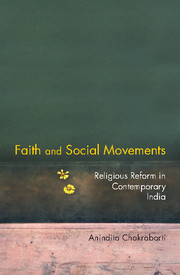Book contents
Introduction: Dissent, Religion and Civil Society
Published online by Cambridge University Press: 28 February 2018
Summary
The philosophers have only interpreted the world, in various ways. The point, however, is to change it.
Karl MarxIf I knew someone is coming over with the expressed intention of doing good, I would flee.
Henry David ThoreauTransforming the self and the world: a reticent dialogue
The book is about the intricate relation between religion, civil society and movements. It revolves around sociology of both civil society and religious movements by opening up a conversation between the two strands. The attempt is also to bring sociological insights from a study of religious movements to reflect on the question of religion in the secular–democratic space. It has been a while since the rise or so-called resurgence of religion has shaken the very ground of secularization theories. Diverse religious movements are a ubiquitous feature of our times. But social movement theories suffer from a serious lag so far as accounting for religious movements is concerned. Framing the question of religious movement in the context of secular-democracy, the book explores two different religious movements in contemporary India. Religious movements have been a blind-spot of movement studies and I argue that this omission is not accidental but epistemological, based on a sense of disquiet in recognizing that religious movements share a space in civil society. The framework of collective identity or the new social movement paradigm questioned the instrumental rationality of resource mobilization as well as class conflict and brought to the fore the question of identity in movements. But the ever-lengthening list of social categories ranging from race, ethnicity, gender, ‘animal rights activists’ and many more, excluded religion and religious movements. Religion came into the discourse of social change as an after-thought at a ‘post-secular’ moment. Though it was not an unknown wisdom that the idea that the world can be transformed lies at the heart of modernity as well as religion. Both post-Enlightenment modernity and Axial Age religion strive to make the world a ‘better place.’ I will elaborate the elective affinity between the two, following S. N. Eisenstadt but before that a few words about the reticent dialogue between religion and movement studies in sociology.
- Type
- Chapter
- Information
- Faith and Social MovementsReligious Reform in Contemporary India, pp. 1 - 26Publisher: Cambridge University PressPrint publication year: 2017

